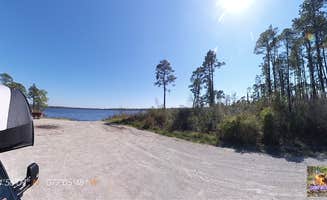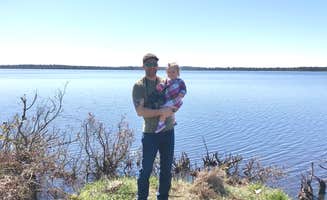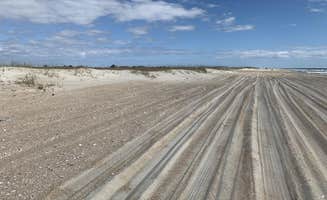Dispersed camping near New Bern, North Carolina centers primarily around Croatan National Forest, which spans 160,000 acres of diverse coastal plain ecosystems. The forest's unique pocosin wetlands and longleaf pine savannas provide distinctive habitat for carnivorous plants including Venus flytraps and pitcher plants native to this region. Winter camping offers significantly reduced mosquito activity compared to summer months when insect pressure becomes intense.
What to do
Wildlife viewing opportunities: Croatan National Forest offers sightings of unique coastal plain species. "Lots of trails and beautiful pines. Pitcher plants and Venus fly traps," notes Ulrich M. about Croatan National Forest.
Beach exploration: Cape Lookout National Seashore provides extensive shoreline access. "We took bikes and enjoyed cycling around at low tide. Be sure to camp above the high tide zone, which is black sand," advises Katie B. from South Core Banks Beach Camping.
Fishing: South Core Banks offers prime fishing locations along its shoreline. "No crowds, lots of open beach, and plenty of fish! If you're looking to camp on the beach and escape the crowds, you've found your spot," shares Jason D.
What campers like
Natural surroundings: The primitive nature appeals to those seeking solitude. "This is about as close to nature as it gets! All primitive camping, no amenities at all. Beautiful natural surroundings," explains Virginia W. about her experience at Croatan National Forest.
Island isolation: The remoteness of Cape Lookout provides an escape from developed areas. "Only accesible by boat Cape Lookout is the perfect getaway. Whether you rent the ferry to take you over, or take the Kayak the beach here is one of the best places to really get back to nature," reports Avery M. from South Core Banks.
Unique wildlife encounters: Wild horses can be observed on certain islands. "We had three young male horses that were always roaming within sight. They even walked close by our campsite," shares Mike H. about his camping experience at Shackleford Island.
What you should know
Access limitations: Hurricane damage continues to affect road conditions. "You can access Great lake with an Atv or SXS. There are passable trails past the barricades but you will need a capable 4x4 to get thru. The lake is virtually untouched and the roads were still in good shape," advises S B. from Great Lake Dispersed Site.
Island camping logistics: Ferry reservations and special permits are required. "The ferry is $135+ for vehicles, plus $20 per person roundtrip. The beach driving permit is $75 unless you buy it by March," explains Katie B.
Complete self-sufficiency required: No services exist in most dispersed camping areas. "Just be sure you know it's on an island, and read the tide tables so you aren't surprised," warns Cathy L. about South Core Banks camping.
Tips for camping with families
Timing considerations: Late spring offers unique natural phenomena. "Show up late in April, early may and you will get to see the bioluminesent plankton wash up sound side, and a hike will leave glow in the dark foot prints," suggests Avery M.
Lighthouse exploration: The Cape Lookout lighthouse provides educational opportunities. "We befriended our neighbors who took us to the lighthouse at the southern end of the island, which was beautiful," shares Katie B. from South Core Banks Beach Camping.
Conservation opportunities: Fall camping can involve wildlife conservation activities. "Show up in October and you may get to help the rangers protect the sea turtles as they hatch," notes Avery M.
Tips from RVers
Vehicle requirements: Four-wheel drive is essential for beach camping. "Tow service ain't nowhere to be found. So, sorry 2WD Chevy Tahoe with aggressive tires - stay home," warns Vince Z. from South Core Banks.
Dispersed camping challenges: Finding suitable locations requires preparation. "Dispersed camping deep in the national forest... Would not recommend tent camping, but great for an RV if you can figure out where to park," advises Carina F.
Pack strategically: No resupply options exist in remote areas. "You should also prepare everything in advance - food, water, essentials. There ain't no corner market here. That includes 4x4 AND recovery equipment," reminds Vince Z.





